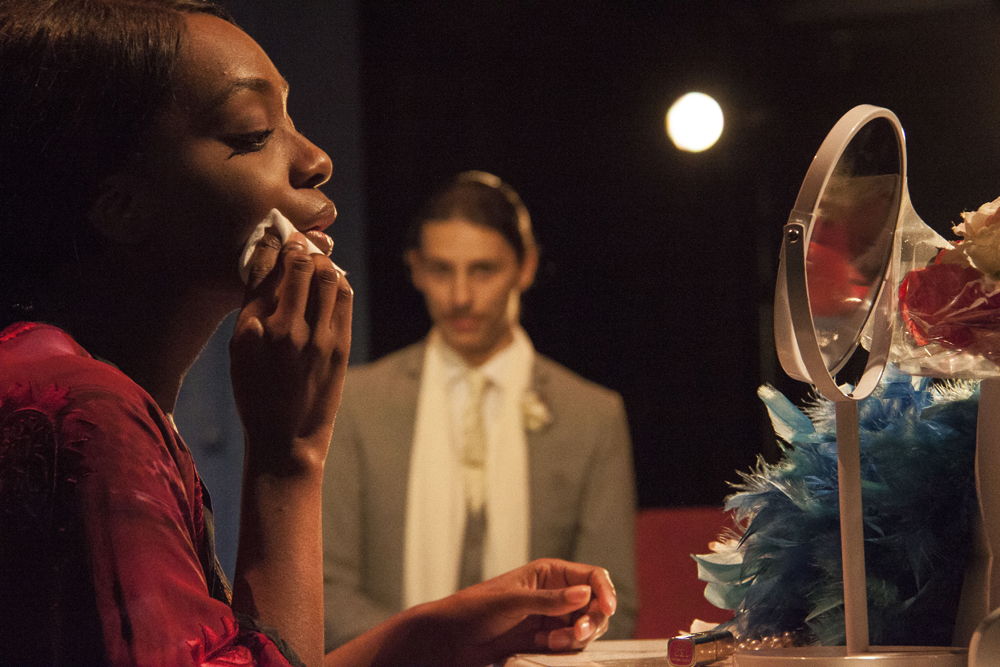Manchester School of Theatre is unique among the twenty members of Federation of Drama Schools. It is part of Manchester Metropolitan University and always was. A number of independent drama schools have merged with, and become part of, universities over the years, but MST has never been anything other than a flourishing institution within a university.
“We now have a fabulous new building with excellent studios, sprung floors, our own theatre and all the rest of it and that’s great but actually the most important thing about any drama school is its students and staff” says David Salter, Programme Leader on the Acting degree. The school is based on Cavendish Square where it sits at the heart of its parent university. “And it means that our students have full, convenient access to all university facilities such as counselling, libraries, student union and so on.”
MST offers three degree programmes at present: BA (Hons) Acting, BA (Hons) Drama and Contemporary Performance and MA/MFA in Contemporary Performance. It has just over two hundred students on these courses at the moment across the three years of its undergraduate degrees. “Yes, we have plans to expand that in the future,” David tells me, “but only very slowly. We’d like to build more post graduate provision, for example. It’s a real advantage for us to be quite small though. It means we all can get to know every student individually and that there is real engagement. The teaching, by the way, is mostly in groups of ten or eleven.”
If they are to remain useful, drama schools need to be very receptive and reactive to changes in the industry and the courses at MST are evolving fast. “We do much more screen acting now than we used to and we bring in cutting edge guest teachers/speakers to keep everything up to date. We had a session with Rachel O’Riordan, artistic director of Lyric Hammersmith, on Chekhov recently, for instance. It means every student is attuned to current thinking and can move on from there” says David, summing up the MST experience as “classical training for the contemporary actor”.
David, a career theatre director, has always taught and has worked in a number of drama schools. He has been at MST for twelve years and in his current post for two. “I just love working with enthusiastic learners” he says.
I can remember, several years ago, being told by a group of MST students how much they’d appreciated the constructiveness of the application and audition process to get a training place. “I think today’s students would still say that” David says with a chuckle, telling me that he and his colleagues have now changed the auditions panel so that it is very diverse and includes several BAME people who are actively supportive of students. MST is also working hard to connect to, and involve, its diverse alumni.
And it’s evidently paying off because of all the offers made for places to start this autumn at MST, nearly forty percent have gone to BAME applicants. David is very hopeful that many of these offers will be accepted.
He is also chipping away at redressing the inequality balance within the training. “We have an audition support scheme within MST – mock auditions, support mentoring and the like – to help people being seen for professional jobs as they leave us. And we get a lot of support in this work from an excellent company called Just Add Milk whose mission is to make the industry more accessible for everyone” says David.
I ask him why a student keen to train should choose Manchester rather than the, arguably, more obvious London. We skirt round the fact that it’s much cheaper to live in Manchester, although that is obviously a factor for many students, while David tells me that MST has many collaborations, partnerships and relationships with local arts organisations such as the Royal Exchange, Hull Truck, Bolton Octagon, Halle Orchestra and Royal Northern College of Music. Manchester and its environs is an artistically flourishing area. “The vibe here is very exciting” says David, telling me that although he’s a Londoner himself he loves the Manchester buzz.
MST is also, David assures me, very conscious of its responsibility to foster well being, mindfulness and mental health. “Of course drama training is not therapy but, equally, it should be about enabling rather than problematising. That’s why we try to develop compassion and empathy so that everyone is on the same page”.
The school which trained, among many more, Julie Walters, George Bukhari, David Threlfall and Sarah Amankwah, MST is clearly worth any student’s serious consideration.
www.theatre.mmu.ac.uk



